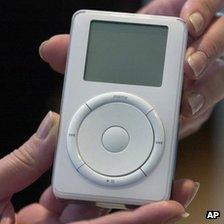Jony Ive and the future of Apple
- Published
- comments

Jony Ive was born and lived in the UK before joining Apple in 1992
Walter Isaacson's biography of Steve Jobs is an extraordinary achievement. As well as a compelling portrait of an often obnoxious genius, he gives us a lively history of the development of consumer technology over the last three decades in which two very different philosophies, open and closed, battle for supremacy in a contest which is still undecided.
But what also caught my eye was one of the supporting cast, a man who was probably second only to Steve Jobs in restoring Apple's fortunes after the co-founder's return to the company.
The British designer Jony Ive has been the man behind the look of the iMac, the iPod, the iPhone and iPad - and everything else that has come out of Apple in the last 15 years, right down to the packaging in which each product was presented.
Like all of Apple's executives, he has hardly ever spoken at an event that is not a product launch, though I did catch him being interviewed at the Royal College of Art a couple of years ago. Now this book brings him out into the light a little more.
We knew that Jobs and Ive were close - he often featured in those famous keynotes, taking an iPhone call from the boss, or explaining on video the design principles behind the iPad.
In the biography Jobs confirms how vital the younger man has been: "If I had a spiritual partner at Apple it's Jony. Jony and I think up most of the products together... he has more operational power than anyone else at Apple except for me."
But, despite a closeness which saw Ive as one of the few at his boss's sickbed right near the end, what also emerges is a good deal of resentment on the part of the designer.
Isaacson says that Ive was upset that Jobs took too much credit for the ideas behind the products.
"I pay maniacal attention to where an idea comes from, and I even keep notebooks filled with my ideas," he tells the author. "So it hurts when he takes credit for one of my designs."
Ideas for the future
But it is also clear that a man described as having the sensitive temperament of an artist is no pushover.
His obsessive focus on getting products to look the way he wanted, no matter what the impact on cost and manufacturing time, led to frequent clashes with Apple's hardware chief Jon Rubinstein.
And when Jony Ive told Jobs to choose between the two of them, it was Rubinstein who ended up leaving the company.

"1,000 songs in your pocket"
Which all begs the question, is Jony Ive now the force that will keep Apple "thinking different"?
He appears to be a much less charismatic - and far nicer - individual than Steve Jobs, gently coaxing ideas out of colleagues, rather than hurling abuse at them.
But he does have the same total confidence in his own feel for where Apple and its products are heading, and what consumers will want.
It is Tim Cook, a man with neither the monstrous ego of Steve Jobs nor the artistic sensitivity of Jony Ive, who has taken over as CEO.
A master of logistics, he has already been in charge for long periods during Jobs' sick leave and the company has kept forging ahead. From now on, a big part of Mr Cook's job will be to prove he can work well with his vice president of industrial design.
Walter Isaacson says Ive bristled when outsiders portrayed Jobs as the only ideas guy at Apple - "that makes us vulnerable as a company."
But having lost a man who was brilliant at visualising the future - and at taking credit for the ideas of his subordinates - Apple's board will want to make sure its other ideas guy stays on board for some time to come.